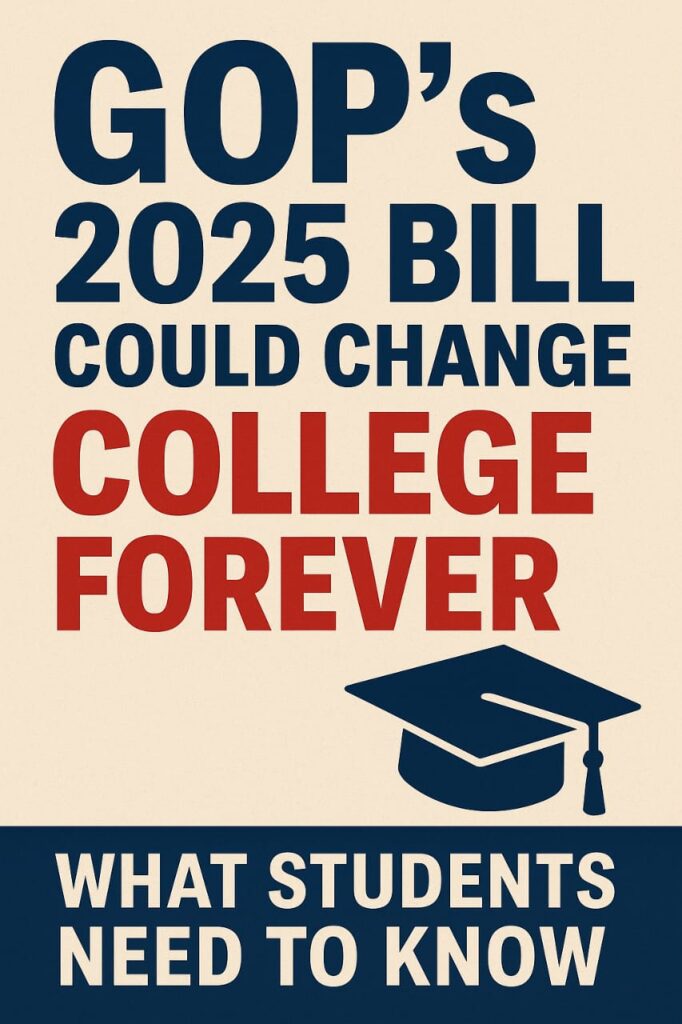
Introduction: Big Changes Coming to U.S. Colleges
In 2025, the Republican Party (GOP) put forward a big education bill. This bill could transform college life for good. This new law affects almost every aspect of campus life. It includes student loans and rules about free speech. If you’re a high school senior, a college student, or a parent, know how this bill might affect your future.
This guide highlights the main points of the GOP’s 2025 college reform bill. It explains what students need to know in simple terms.
What is the 2025 GOP College Reform Bill?
A Quick Overview
Republicans in Congress proposed the Higher Education Accountability and Reform Act of 2025. It aims to alter college funding, improve student loans, and shape how schools deal with political and cultural issues on campus.
Supporters say the bill will increase transparency and reduce government waste. Critics argue it could make college more expensive and less inclusive.
Student loans and financial aid may look very different.
Tighter rules on student loans.
The bill proposes stricter limits on federal student loans. Under the plan:
- Students may borrow less money each year than they did before.
- Some graduate programmes may no longer qualify for federal loans.
- They may remove interest subsidies on some loans.
This means students may need to use more private loans. These loans often have higher interest rates and fewer protections.
FAFSA and Pell Grant changes
The GOP bill would also change the process of awarding Pell Grants. Students from middle-income families could get less federal aid. At the same time, those in short-term job training programmes might get more help.
Colleges will face new rules on free speech and politics.
Political Neutrality Requirements
A key part of the bill says all public colleges must show they are “politically neutral.” Schools might lose federal funding if they favour or oppose any political group.
Critics fear this might limit campus events. They worry schools could ban controversial speakers to dodge legal issues. Supporters say it protects freedom of speech for all.
Restrictions on DEI (Diversity, Equity, and Inclusion) Offices
The bill would block federal funds from going to campus DEI offices. Supporters argue that DEI programmes push “ideological agendas.” Critics say these programmes help students of colour, LGBTQ+ students, and others who often feel left out.
Career-Focused Programs Get a Boost
More support for vocational training.
Instead of pushing everyone towards a four-year degree, the bill invests more in short-term training and certification programmes. These are for jobs like coding, plumbing, cybersecurity, nursing, and more.
The aim is to bridge the skills gap and link students to jobs that don’t need a traditional college degree.
What students need to do now.
Pay attention to policy updates.
Congress is still debating this bill, so nothing is final yet. But it’s smart to stay informed. If it passes, it could affect:
- How much aid did you get?
- What majors are worth the cost?
- Whether your college stays eligible for federal support.
Talk to a college adviser or financial aid expert.
Ask how these proposed changes could impact your college plans. Financial aid offices and high school counsellors can help you make smart decisions.
Conclusion: This Bill Could Reshape the College Experience
The GOP’s 2025 college reform bill could change U.S. higher education a lot, whether you agree or not. It could change college life, how students pay for it, and the types of learning spaces allowed.
If you’re thinking about college soon, now is the time to learn about the issues and speak up.